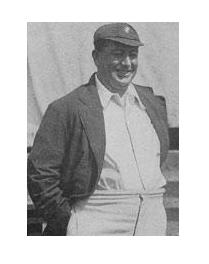Monday Milestone: The Big Ship
“If ever there was a man singled out as a king of sport it was Mr Armstrong, who had gone out to give the people of England a chance to regain the Ashes and who had returned, like Imperial Caesar who came, saw, and conquered”
– Former Prime Minister W.M. Hughes
This Week in History:
1921, March 1
The Australian cricket team led by Warwick Armstrong secures the Ashes for the first time by a whitewash, winning 5-0 against England.
In Australia, summer is inextricably linked to cricket. With those long hot summer days that seemingly stretch on forever watching the men in white (or colour these days). But then, this time of year arrives, spelling the end of the cricketing summer, as the leaves begin to turn colour, the autumn appears and the footy seasons begin.
So as a farewell to the summer that was, this week the Milestone reflects on a cricket season well before this one, that until recently stood unparalleled.
In 1921, Australia was a very different place. Like most countries, the nation was still reeling in the aftermath of the Great War, mourning the cruel loss of so many, and the cricketing world was not left unscathed. Test cricket lost many of its own, with sport abandoned for gunfire, and the Ashes not contested for nine years. So when the English returned to Australiain 1920, it was a very different world.
By that stage Australia was captained by Warwick Armstrong. They called him the ‘Big Ship’ with good reason. Armstrong was an enormous man, standing six foot three, and weighing in at approximately 133kg. Remarkable for his size, was his sporting prowess. Not only was he an all rounder in Test cricket who finished with 2,863 runs and 87 wickets, he also played briefly for South Melbourne in the VFL during his younger days.
But by the summer of 1920-21, Armstrong was 41 years old. He’d been a Test cricketer for twenty years, interrupted by the war, and this was his last series on Australian soil, one that would prove to be remarkably one-sided.
The first test in Sydney saw Armstrong bat at seven, posting 158 to secure victory. An innings victory followed in Melbourne over the New Year. Another Armstrong century at the Adelaide Oval, and then an unbeaten 123 in the fourth Test at the MCG suddenly had the series at 4-0 – poised for a unprecedented whitewash.
Heading back to Sydney for the final Test, Armstrong already had 464 runs for the series at an average of over ninety. At over forty years of age, I’m sure this gives Ricky Ponting hope. But a whitewash? This had never been seen in the history of the Ashes.
So when Australia wrapped up that final Test by nine wickets, it would not just create history for the 5-0 drubbing, it would also form part of the longest Test match winning streak for decades. As captain, the Big Ship was undefeated.
The legacy of Armstrong’s summer is held in the longevity of the record. Not until the era of Australia’s two greatest wicket takers, Shane Warne and Glenn McGrath would the feat ever be matched.
They called Warwick Armstrong the Big Ship. He was a big man, with a big talent. But considering such a whitewash in 1920-21, this feat was arguably even bigger still.
The Milestone Five: Biggest drubbings in an Ashes Series
5. 1958-59: Australia 4, England 0.
After a decade of English supremacy Richie Benaud’s men turned the tide, bringing the Ashes home for the first time in seven years comprehensively.
4. 1978-79: England 5, Australia 1.
With the only copybook blot being a loss at the MCG, the Poms dominated the summer, taking advantage of World Series Cricket absentees.
3. 1920-21: Australia 5, England 0.
Warwick Armstrong’s men win every Test match and go on to win the next three in England as well later that year.
2. 2006-07: Australia 5, England 0.
Australia’s most recent taste of Ashes victory as Shane Warne, Glenn McGrath and a host of others exited the game with a whitewash over the old foe.
1. 1948: Australia 4, England 0.
There’s a reason why Don Bradman’s men were called ‘the Invincibles’. An entire tour of Englandwithout a single loss, famous for Bradman’s retirement.

